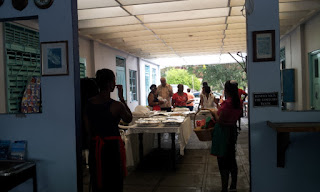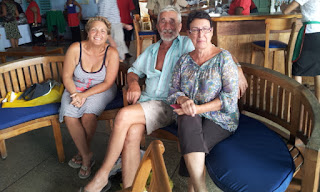On Sunday, December 2nd, we thought of having
lunch at the Grenada Yacht Club. We like yacht clubs, and had applied to become
members. Not that it is necessary to use the facilities, but because we prefer
belonging to them.
Anyway, we hopped into the dinghy and made the short ride
over there. When we got to the main restaurant/bar area, which is very spacy
and breezy, with partial view of the bay, we saw that there was quite an
activity going on, volunteer islanders with red/green aprons running around,
loading long tables with big trays of food. All the tables were already set
with white table cloths and flower centre pieces; everything looked nice and
formal. We asked the bartender if it was a private function, but she assured us
that we could stay, and contribute to the charity by buying tickets for the
food, and pay the bar for the drinks. There was a couple making nice music at a
corner. Tickets turned out to be 35.00 EC, food smelled excellent Perfect
setting for us!



We were the first customers around 12:15 pm. So we settled
at an inner corner, and watched the hustle and bustle of the volunteers, still
carrying the trays of food to the serving stations. People started to trickle
down and settled at the tables. While we were eating, an elderly sailor asked
us about the function, then came and sat with us, bringing his wife. We had a
nice chat, and learned that they came from Trinidad the day before, reaching
Belmont, St George’s around 10:00 pm. They had rain all the way for 16 hours,
and needed food, drinks, showers, etc. The club is perfect for their purpose,
since food and drinks are cheap, showers free, unlike the marina just at the other
end of the lagoon.

We learned from the couple that they were from France,
gallivanting all over the Atlantic down to Brazil. They had spent three months
there, but had to leave at the termination of their visa. Apparently since
France does not allow non-Europeans to stay there longer than three months,
Brazil does the same to French; tit for tat. Their sail to Trinidad had been
long and arduous, because of high seas and strong winds, but they had no
choice. He also strongly recommended Trinidad as a place to safely leave the
boat for the hurricane season, because of its being located below the hurricane
belt and having facilities more plentiful and cheaper than most islands in the
Caribbean. When we questioned him about the crime rate, which we had heard from
other sources to be quite high, he just gave the French “pah”, and said that he
had been leaving his boat at Chaguaramas, Port of Spin, for the last five years
without any incidents. Food for thought for us!
While we were talking, some islanders came and greeted us
warmly, for no apparent reason. The French sailor started to praise the people
of Grenada, in comparison to the French islands. He thought that the people in
Guadeloupe and Martinique were not so polite or friendly. He said that they did
not have to work, since the French government was giving extensive social
benefits for large families. His opinion was that men’s virility was their new
tax bracket at those islands. That was his opinion. We knew nothing about their
politics, but our limited bad experiences in both of the islands made us laugh
at his comments.
He also mentioned their plans for the near future, saying
that they were going to sail up to Brunswick, Carolina, leave the boat there
for a while during a visit to France, then come back and cross the Atlantic and
spend some time in Turkey. Apparently he
had been to Marmaris and Fethiye before, and his daughter was living in
Marmaris at the moment. We were pleasantly surprised and told him we were
originally from Turkey. Of course, Al related all his sailing adventures around
that area with his high school buddies, no end for discourse.
In the meantime, a steel band comprised of twenty plus drums
of different sizes and shapes was being formed next to us. We watched the continuous
bustle of young boys and girls bringing the pieces to mount on tripods. After
half an hour of hard labour, the group started their music. The sounds and
rhythms they created were incredible. Our friend had something to say about the
band as well; apparently steel band tradition was started in Trinidad after the
WW2, young Trinidadians making use of the steel oil drums left by the American
navy. The only thing we knew about the issue is that Trinidad steel bands are
famous. It seems that their neighbours are continuing the tradition, and doing
a very good job of it. It was a pleasure to listen to them.











